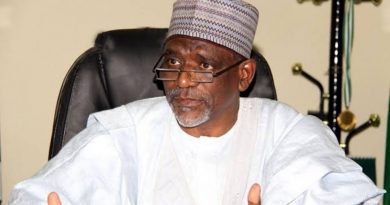Open Letter to FG, NUC, VCs: Why Accounting Curriculum Needs Complete Overhaul
By Nwogboji Emmanuel Usulor
Respected Sirs, I am writing you this open letter hoping it will provoke an urgent reaction from you thereby saving our education system from further decay.
The collapse of the small, medium, and large businesses and the economic inefficiency of government agencies arising essentially from the failures in their accounting practices have far-reaching implications for accounting education in Nigeria.
It is an indictment of the quality of the accounting education system and therefore a clarion call for universities to evaluate the quality of accounting education delivery in Nigeria.

The accounting curriculum in the Nigerian universities should be derived from a detailed assessment of accounting services needs of different interest groups in the society namely business organizations, government, and international agencies.
To appropriately accommodate the diverse needs of these different groups, university accounting curricula should provide for a broad knowledge base, the acquisition of accounting skills, and the development of appropriate behavioral attitudes in accounting graduates.
Sirs, the core curriculum of an accounting degree in the Nigerian universities are still focused on basic accounting (i.e., debits and credits, T-charts) as if we are still in the early1960s.
Almost no technology is taught, neither modern accounting systems such as Sage 50, Quickbooks Online, Xero, Sage Intaact, and Oracle Netsuite, nor modern tax software such as CCH’s Prosystems/Axcess and Thompson’s Ultratax/Geosystems.
Even the Ms Excel that’s widely used in computations cannot be used by about 90% of accounting graduates in the analysis of accounting data. Over 95% of the university accounting lecturers teach accounting courses as if personal computers were never invented, or that Nigeria never transitioned to a service-based economy.
READ ALSO: 10 Best Free Accounting Apps for ABU Accounting Students
About 98% of the accounting graduates cannot quote any of the sections in Tax laws nor discover loopholes in the tax laws, while taxation is one of the major sources of revenue for the Nigerian Government. About 95% of the accounting graduates cannot discuss any of the International Financial Reporting Standards (IFRS).
Based on the current reality checks in Nigeria, we hardly see a B.Sc. degree holder in accounting who can prepare ordinary statements of profit and loss account or bank reconciliation statements using real-life data. Oh, what a shame! It’s like graduating as a Medical Doctor without the capacity to handle common health challenges.
I graduated from one of the emerging world-class universities—Alex Ekwueme Federal University in 2018, but I learned almost nothing in school that applies to the technical tasks in tax and consulting services that I currently do as a chartered accountant under the Institute of Chartered Accountants of Nigeria.
I had to learn almost everything on the job and through continuing professional education. Without the right mentorship, I could have easily fallen through the cracks, decided that becoming a professional accountant wasn’t for me, and transitioned out of the profession, just as many young graduates with B.Sc and HND in accounting are doing.
As a matter of fact, on 20th August 2021, I voluntarily withdrew my M.Sc Accounting (Forensic) admission at Alex Ekwueme Federal University when I discovered that the course content accredited for M.Sc Accounting degree in the Nigerian universities by the National University Commission can only offer me a certificate without an equivalent knowledge and skills.
Accounting should be 50% practical and 50% theoretical because the profession is under management science and one of the disciplines that can boost the economy of Nigeria if adequate attention is given to it. The university accounting curriculum is outdated and needs to be completely overhauled.
First, stop teaching accounting with ONLY pen and paper. Classes can spend one day on how things used to be done—as a history/theory lesson—but then needs to move on to spreadsheets and software.
At the undergraduate level, students need to learn how to reconcile cash and bank transactions using modern technologies, interpret a balance sheet, prepare a tax return, take advantage of loopholes in tax laws and reduce tax liabilities, formulate strategies to eliminate the loopholes in tax laws, conduct audits using computer-assisted audited techniques (CAATs), combat financial malpractices in private and public sectors, and advise clients without fallen a victim of professional negligence.
At the postgraduate level, it is not proper to offer students M.Sc Accounting. The reason is that accounting is an extremely broad discipline, and affects many aspects of the economy. After B, Sc degree, Universities should develop a program structure that will enable students to specialize in Taxation, Auditing, Costing, Forensic, or Financial accounting.
The course outline for M.Sc Auditing should be different from the course outline for M.Sc Taxation. That is to say, the course structure for each area of specialization should be unique. At times, two closely related sub-areas could be merged.
Universities can also partner with professional accounting bodies like ICAN, ANAN, or ACCA to award M.Sc Profession Accounting. For instance, in the University of South Wales, one of the world-class universities in the UK, there is M.Sc Finance and Investment, M.Sc Financial Services Management, M.Sc Forensic Auditing & Accounting, and M.Sc Professional Accounting (with ACCA Tuition).
The outdated structure of M.Sc Accounting in most Universities in Nigeria will only create an avenue to graduate accountants who will be jacks of all trades and masters of none.
For our universities to deliver on their mandates, the quality of the training given to individuals passing through accounting course should be such that can give adequate skills and information needed in the real-world sense. Lecturers need to follow the current trends in the accounting industry and also take note of where the profession is transitioning to, which is consulting and advising.
In the same vein, accounting students at their 300level should be sent for six months of compulsory industrial training in professional accounting firms where they will be groomed on accounting consulting services which will enable them to be Job creators after graduation from the university.
Or better still, a Bachelor of Science in Accounting should be considered a 5-year degree program. Upon graduation, students can qualify for placement in professional schools like ICAN, ANAN, or CITN to qualify as chartered accountants or chartered tax practitioners.
The world has changed, and the accounting profession is changing with it. Nigerian universities need to catch up by overhauling the accounting degree curriculum. As such, I humbly implore the managements and the regulatory authorities of the universities in Nigeria to review the curriculum for accounting and take necessary steps towards improving accounting education in Nigeria.
Regards,
Nwogboji Emmanuel Usulor
Qualified Chartered Accountant
+2348063558464 | Nwogboji20@gmail.com
For Advert Placement, Sponsorship, support, Article submission, suggestion, etc, Contact us: info@theabusites.com, +2349015751816 (WhatsApp)








